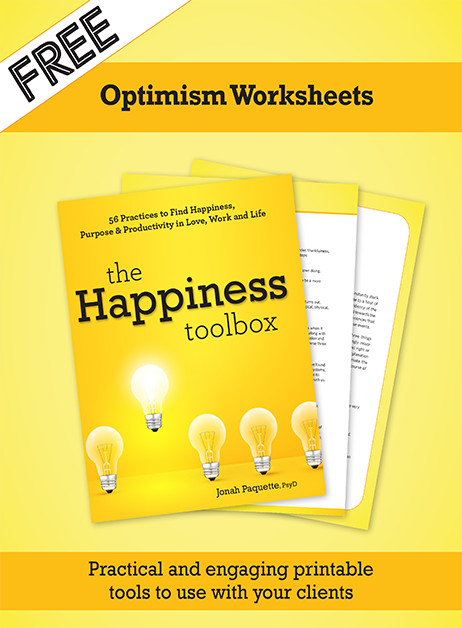Look on the Bright Side
FREE Optimism Worksheet

What is Optimism?
The concept of optimism may mean different things to different people and therefore requires a bit of unpacking. The word "optimism" itself comes from the Latin word "optimum" which roughly translates to mean “best.” At its core, optimism is closely connected with the ability to see things in a good light, both in terms of our future as well as events that are occurring in our lives. The key type of optimism is referred to as dispositional optimism and is defined as follows:
● Having hope or confidence regarding the future
● Believing that challenges and obstacles can be overcome
In other words, when we reflect on our future, do we look forward to it with anticipation, expecting that things will turn out well? Or do we nervously glance ahead with worry, believing that storm clouds are approaching? Generally speaking, optimists believe that the coming days will be positive, and that they will be able to accomplish many of their hopes and dreams. Optimism does not mean that life is without challenge or pain, and in fact a key component of optimism is to be able to see things in a realistic (rather than overly pessimistic) light.
Why Practice Optimism?
We are often told to “look on the bright side” or learn to “see the glass as half full.” Although these sorts of recommendations seem trivial, they nonetheless hold great truth. In short, there have now been countless studies showing both the negative consequences associated with pessimism, as well as the numerous benefits linked to optimism. By training ourselves to become more optimistic, we can reap a wide range of benefits for our mental health and physical well-being.
The Psychological Benefits of Optimism
Whereas pessimism has been closely linked to a number of negative outcomes including depression, anxiety, and even suicide, optimism is among the most important ingredients for a life of happiness and well-being. Studies show that individuals who are more optimistic have lower rates of depression and anxiety, higher rates of life satisfaction and happiness, and are more resilient in the face of stress. It's' thought that one of the key benefits of optimism is that it short-circuits rumination, which is strongly linked to negative mood states like depression and anxiety.
The Health Benefits of Optimism
Not only are grateful individuals happier, research suggests that they are healthier as well. Studies have found that individuals who regularly practice gratitude have improved overall physical health, stronger immune systems, and reduced rates of stress-related illnesses. Not only that, but research has linked the practice of gratitude to other benefits such as getting better sleep (as much as an extra hour per night), and exercising more (as much as 90 minutes more per week).
The Interpersonal Benefits of Optimism
Grateful individuals have stronger interpersonal relationships, including more satisfying romantic relationships, across a number of studies. They also are more altruistic and likely to donate to charities and engage in volunteer work, and are even more able to let go of resentments and foster forgiveness.
The Optimistic Brain
Cultivating optimism impacts our brain in a number of ways according to the latest research. First, optimists tend to display greater activation in their left prefrontal cortex, an area of the brain closely linked to positive emotional states. Additionally, they show decreased sensitivity in their amygdala, the small part of our brain that fires up our fight-or-flight response during times of stress. Finally, optimists display greater activation in a region of the brain known as the orbitofrontal cortex, which is associated with helping us to better regulate our emotions and decrease our anxiety.
Want to help your clients discover the benefits of optimism?
Download this FREE practical and engaging printable Slow and Steady Wins the Race Worksheet, taken from the Happiness Toolbox, to use with your clients today!


The Happiness Toolbox is here to help, by providing you with science-backed exercises to change your life. An interactive journaling format helps you learn how to choose happiness by adding simple habits into your daily life - putting you in a long-lasting and fulfilling state of mind.
In addition to his clinical work and writing, Dr. Paquette offers training and consultation to therapists and organizations on the promotion of happiness and regularly conducts professional workshops around the country. He is also a frequent media contributor, having been featured in print, online and radio outlets. He has a passion for imparting the key findings related to happiness and wellbeing with a broader audience, and he is honored to share these with you.
Learn more about their educational products, including upcoming live seminars, by clicking here.
Topic: Happiness
Tags: Activity | Advice | Happiness | Happiness | How To | How to be happy | Mindfulness | Success | Therapy Tools





